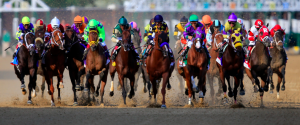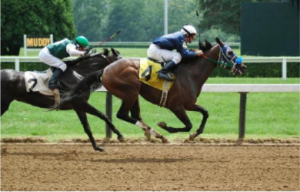By Joe Plunkett
With the Cheltenham Gold Cup just over a fortnight away, excitement continues to build within the National Hunt racing community and there’s no little sense of relief either after the recent outbreak of equine flu had threatened to badly affect the world’s best chase race.
What is it that makes the Gold Cup so special though? It is one of 20 Grade One chase races on the calendar in Great Britain and just one of 14 Grade 1’s at the Festival. Despite this, it has a special place in the hearts of trainers, owners, jockeys and punters around the world.
When Is The 2019 Gold Cup?
The 2019 Gold Cup is the fourth race of 7 on the last day of the Festival, Friday March 15th at 3.30pm.
The Blue Riband
Known as the Blue Riband of National Hunt racing, this event is seen as the pinnacle for all jumpers and it’s easy to see why. The race has a rich history first of all having been run since 1819.
Many things have changed in those 200 years, but in terms of its modern day standing, it’s harder to win than ever. Cheltenham Racecourse, in its current form, provides just about the sternest test for a chaser and so adding in the three-and-a-quarter mile distance here makes this the hardest out there to win.
Given its status, the best of the best in the three-mile division usually take part so in terms of competitiveness it is already difficult to score. Prestbury Park’s undulations and layout also mean a horse needs to have a little of everything; pace to get a good position in the race, jumping prowess for obvious reasons, balance as some of the fences come at a crucial downhill turn as the pace increases, then of course great stamina to see out this trip going uphill towards the line.
This is why Gold Cup winners are particularly revered and despite the commercial success of the Grand National, this race rates as easily the number one jumps race anywhere in the world in terms of quality.
Gold Cup Money
The prize fund for the Gold Cup this year sits at over £600,000 with fully £369,000 going to the winner, a prize that befits the race’s position within the sport.
The money that the Gold Cup generates is simply something else though. The Festival overall will generate around £500 million in betting turnover in the UK alone but this one race sits second only to the Grand National as the most popular individual race on the calendar with punters.
Gold Cup day alone can generate anywhere between £150m-£200m for the industry in terms of betting both in land-based shops and online betting brands that focus on the race, none of this taking into account ticket sales, food and drink at Cheltenham itself as well as TV money with the race shown on both ITV and Racing TV as well as in every betting shop in the country.
Past Winners
The casual punter would be forgiven for thinking that jump horses whose names roll off the tongue are always likely to have been Grand National winners such as Red Rum. But think of such names as Mill House, Arkle, Dawn Run, Desert Orchid, Best Mate, Denman and Kauto Star and you’ll be thinking of great Gold Cup winners.
All of these horses, plus many more, have written their names into horse racing folklore having won this race and despite it being run every twelve months the competition among trainers and owners is so great that many top names have never won the race, case in point current master trainer Willie Mullins.
This Year’s Contenders
At the head of the market is Patrick Kelly’s Presenting Percy who has only run once since winning the RSA Chase at last year’s meeting, just ahead of Paul Nicholls’ impressive King George and Denman Chase scorer Clan Des Obeaux and let’s not forget that the bang in form trainer has won this race with three different horses.
Last year’s winner, Native River, is next in a clutch of Willie Mullins horses looking to break the Irish trainer’s hoodoo: Bellshill, Al Boum Photo and Kemboy while 11-year-old Thistlecrack cannot be discounted at this stage.



